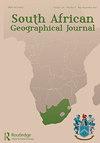了解当地行动者对公共牧场可持续管理威胁的看法和参与式地理信息系统(PGIS)的作用:以南非Vulindlela为例
IF 1.1
4区 社会学
Q3 GEOGRAPHY
引用次数: 0
摘要
本文章由计算机程序翻译,如有差异,请以英文原文为准。
Understanding local actors’ perspective of threats to the sustainable management of communal rangeland and the role of Participatory GIS (PGIS): the case of Vulindlela, South Africa
ABSTRACT Rangelands in arid and semi-arid regions serve as grazing land for domesticated animals and therefore offer livelihood opportunities for most pastoral communities. Thus, the exposure of most rangelands in arid and semi-arid regions to threats that are associated with natural, social, economic, and political processes affects their capacity to provide socioeconomic and environmental support to the immediate and global communities. In spite of the effects of rangeland transformations on both the natural and human environment, the assessment of threats affecting rangeland productivity has often been approached from a conventional scientific perspective. Most existing literature is focused on the assessment of threats to the biophysical environment. As such the social dimension of rangeland threats is not well understood. This research employed participatory rural appraisal (PRA) and PGIS techniques to assess rangeland threats and management actions from a local perspective. The result revealed that local actors prioritize threats to their social and economic needs over threats to the biophysical environment and their preference is informed by the frequency and magnitude of the threats. The outcome of the research demonstrates the need to promote rangeland governance through interdisciplinary and inclusive participation in research and development.
求助全文
通过发布文献求助,成功后即可免费获取论文全文。
去求助
来源期刊

South African Geographical Journal
GEOGRAPHY-
CiteScore
3.40
自引率
7.10%
发文量
25
期刊介绍:
The South African Geographical Journal was founded in 1917 and is the flagship journal of the Society of South African Geographers. The journal aims at using southern Africa as a region from, and through, which to communicate geographic knowledge and to engage with issues and themes relevant to the discipline. The journal is a forum for papers of a high academic quality and welcomes papers dealing with philosophical and methodological issues and topics of an international scope that are significant for the region and the African continent, including: Climate change Environmental studies Development Governance and policy Physical and urban Geography Human Geography Sustainability Tourism GIS and remote sensing
 求助内容:
求助内容: 应助结果提醒方式:
应助结果提醒方式:


